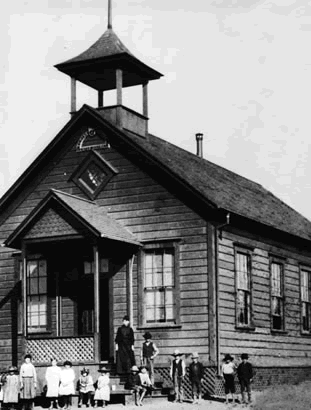Books2day
Books? What Books?
Here is something to share with the kids if they are already disillusioned with back-to-school, lunches, riding the bus, lugging books or not finding Minecraft or Facebook on the school computers.

If you lived in a rural area of America in the 19th or early 20th centuries, you probably went to a one-room schoolhouse. Attendance was not legally mandated, and just over half of all kids even got to go to school. Heat in winter came from a single wood stove.
The school year was shorter, generally 130 days compared to 180 now. School days were also shorter (often 9AM to 2PM) but there were no buses and kids were expected to walk up to 4-5 miles to get there. Shoes optional?
There were no school lunches even if you could afford them. Food was brought from home in metal pails. Often a small school had no books, and the only tablets were made of slate and required chalk to write on. At least they had erase and insert features.
Last, but not least, it was common for students to permanently finish school by the 8th grade if they could pass a test like the one below. Think you could pass the 8th grade today?
If none of this phases the kids, the next time they complain about school you can break out the parental favorite:Well, I had to walk five miles to school, uphill both ways, in all weather, with nothing but a windbreaker and sneakers, carrying 40 lbs of books under one arm and a stick in the other to ward off packs of wild dogs!
Typical questions for an 8th grade final exam in the 1890s.
Bonus points for even knowing what “orthography” is…
GRAMMAR
(Time, one hour)
1. Give the nine rules for the use of Capital Letters.
2. Name the parts of speech and define those that have no modifications.
3. Define: Verse, Stanza and Paragraph.
4. What are the principal parts of a verb? Give the Principal Parts of do, lie, lay, and run.
5. Define Case. Illustrate each case.
6. What is Punctuation? Give rules for principal marks of punctuation.
7-10. Write a composition of about 150 words and show there in that you understand the
practical use of the rules of grammar.
ARITHMETIC
(Time, 1 1/2 hours)
1. Name and define the Fundamental Rules of Arithmetic.
2. A wagon box is 2 ft. deep, 10 feet long, and 3 ft. wide. How many bushels of wheat will it hold?
3. If a load of wheat weighs 3,942 pounds, what is it worth at 50 cts. per bu., deducting 1050 lbs. for tare?
4. District No. 33 has a valuation of $35,000. What is the necessary levy to carry on a school seven months at $50 per month, and have $104 for incidentals?
5. Find cost of 6,720 lbs. coal at $6.00 per ton.
6. Find the interest of $512.60 for 8 months and 18 days at 7 per cent.
7. What is the cost of 40 boards 12 inches wide and 16 ft. long at $20 per in.?
8. Find bank discount on $300 for 90 days (no grace) at 10 per cent.
9. What is the cost of a square farm at $15 per acre, the distance around which is 640 rods?
10. Write a Bank Check, a Promissory Note, and a Receipt.
U.S. HISTORY
(Time, 45 minutes)
1. Give the epochs into which U.S. History is divided.
2. Give an account of the discovery of America by Columbus.
3. Relate the causes and results of the Revolutionary War.
4. Show the territorial growth of the United States.
5. Tell what you can of the history of Kansas.
6. Describe three of the most prominent battles of the Rebellion.
ORTHOGRAPHY
(Time, 1 1/2 hours)
1. What is meant by the following: Alphabet, Phonetic, Orthography, Etymology, Syllabication?
2. What are elementary sounds? How classified?
3. What are the following, and give examples of each: Trigraph, Subvocals, Diphthong, Cognate, Linguals?
4. Give two uses of silent letters in spelling. Illustrate each.
5. Define the following prefixes and use in connection with a word: Bi, Dis, Mis, Pre, Semi, Post, Non, Inter, Mono, Super
6. Mark diacritically and divided into syllables the following, and name the sign that indicates the sound: Card, ball mercy, sir, odd, cell, rise, blood, fare, last.
7. Use the following correctly in sentences: Cite, site, sight, fane, fain, feign, vane, vein, raze, raise, rays. Write 10 words frequently mispronounced and indicate pronunciation by use of diacritical marks and by syllabication.

 6
6
 7
7



